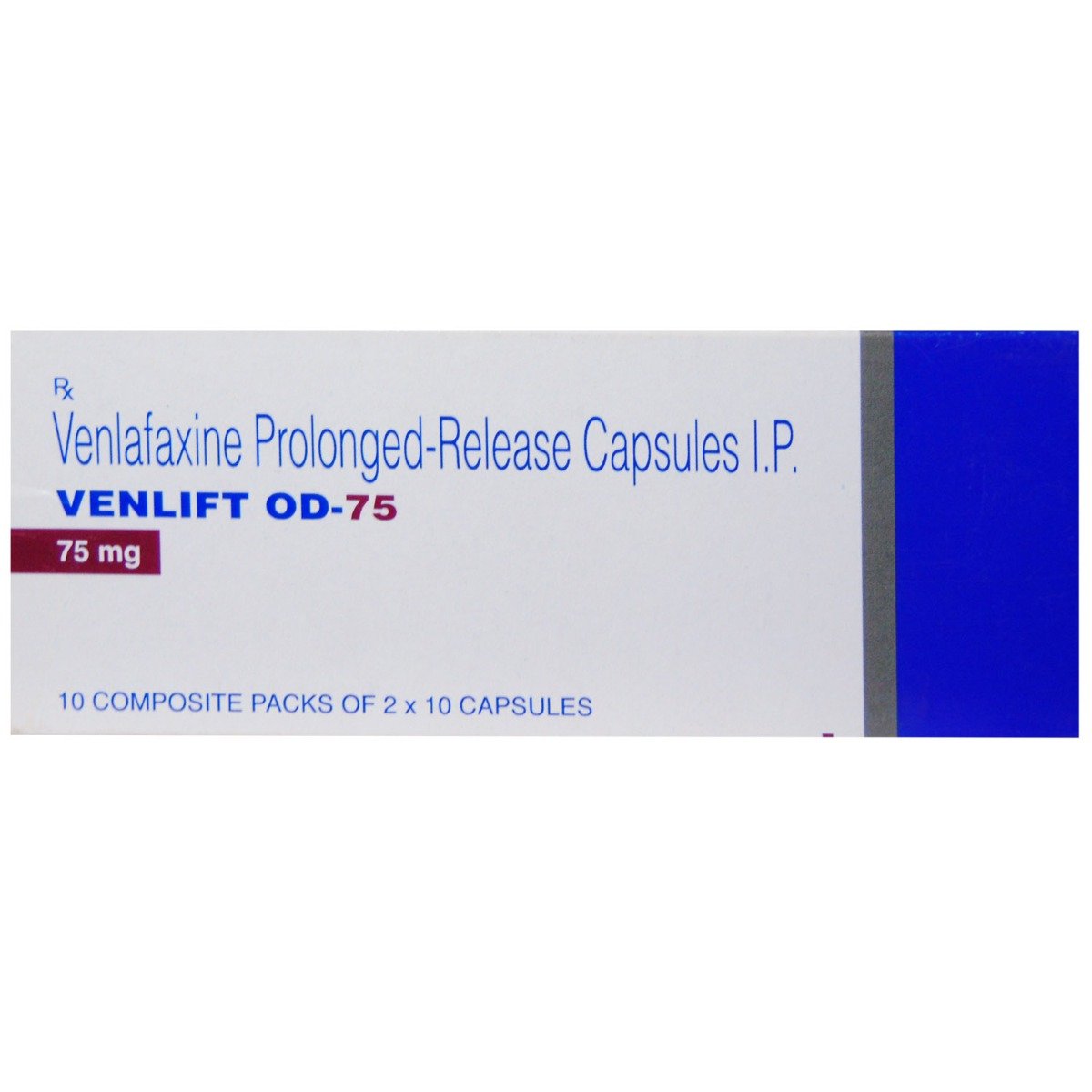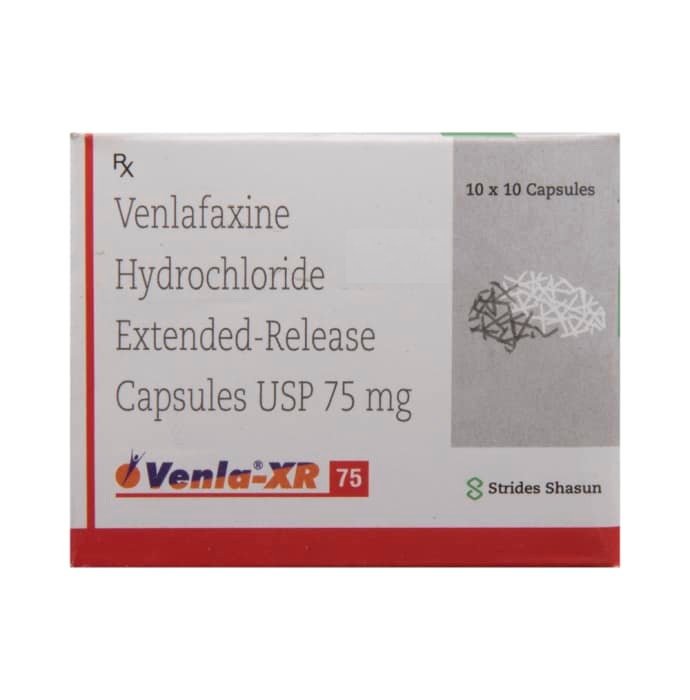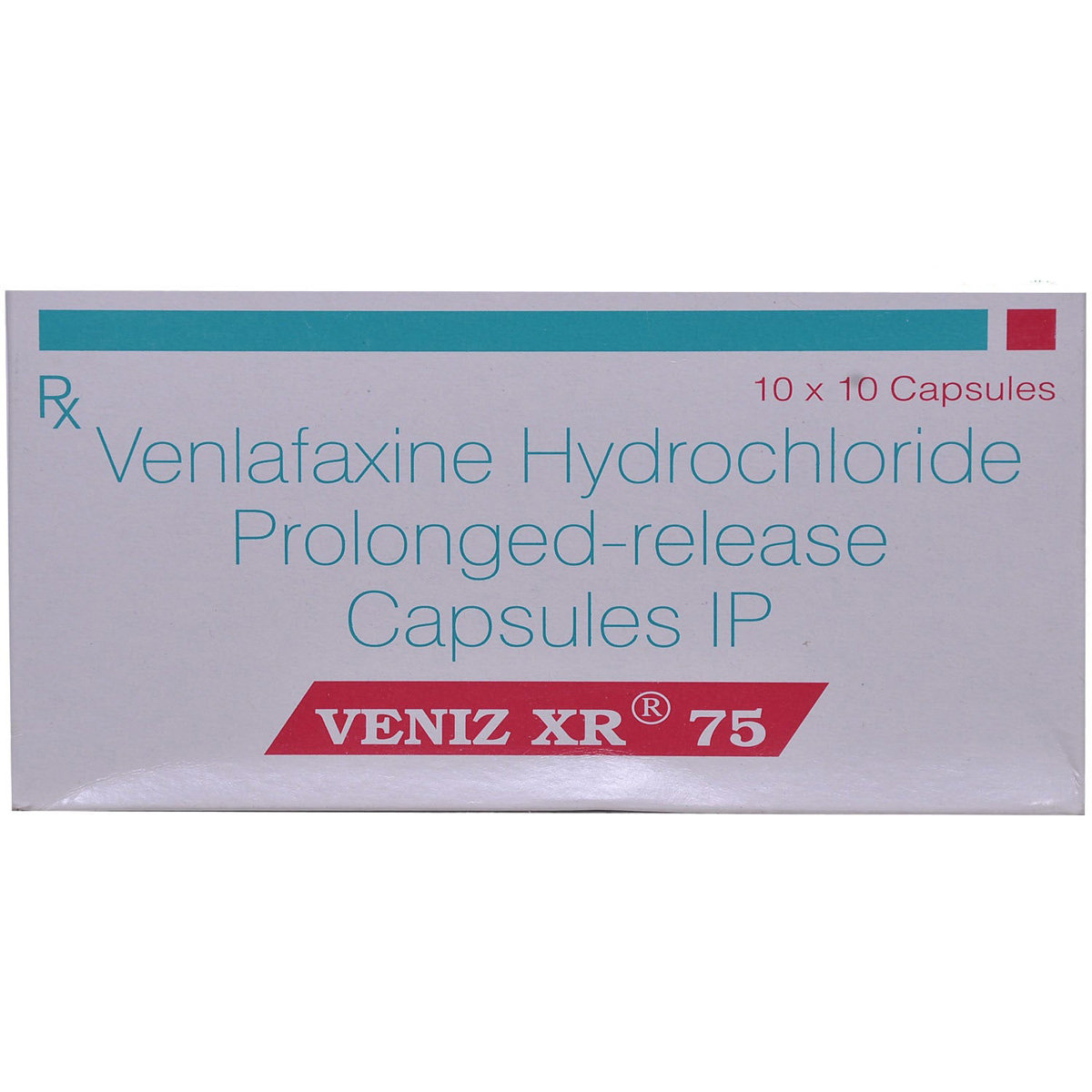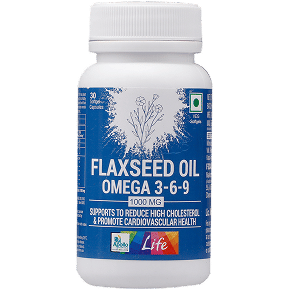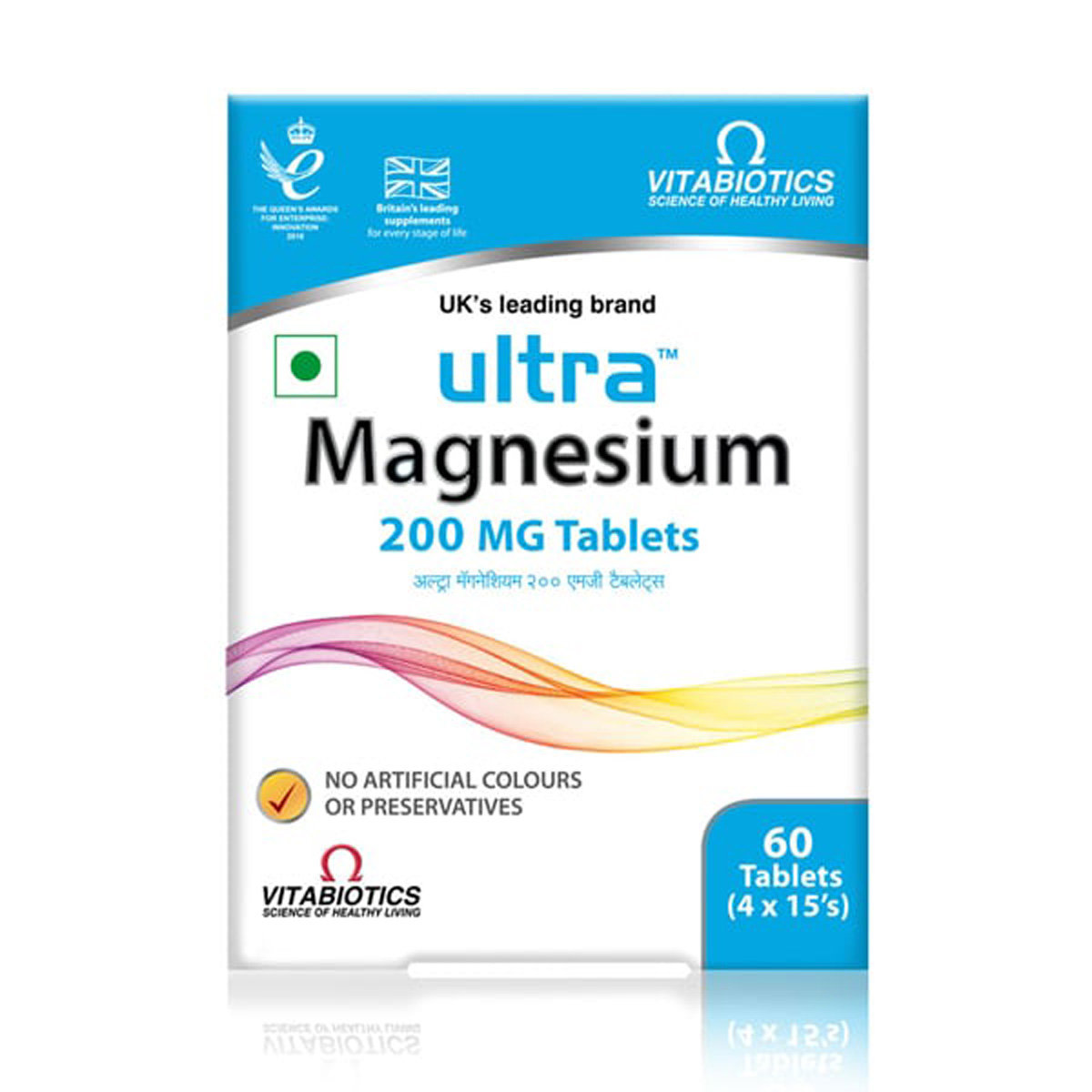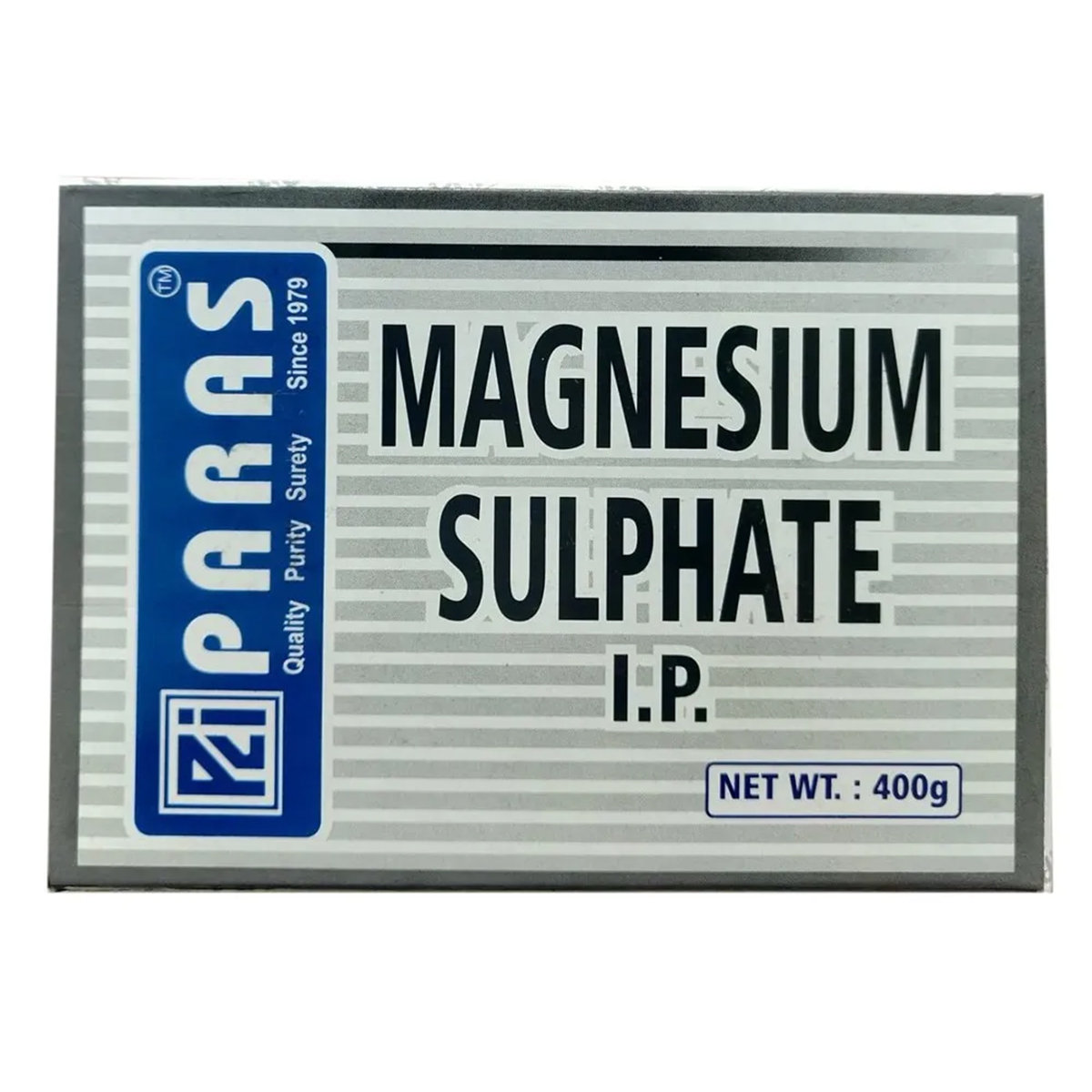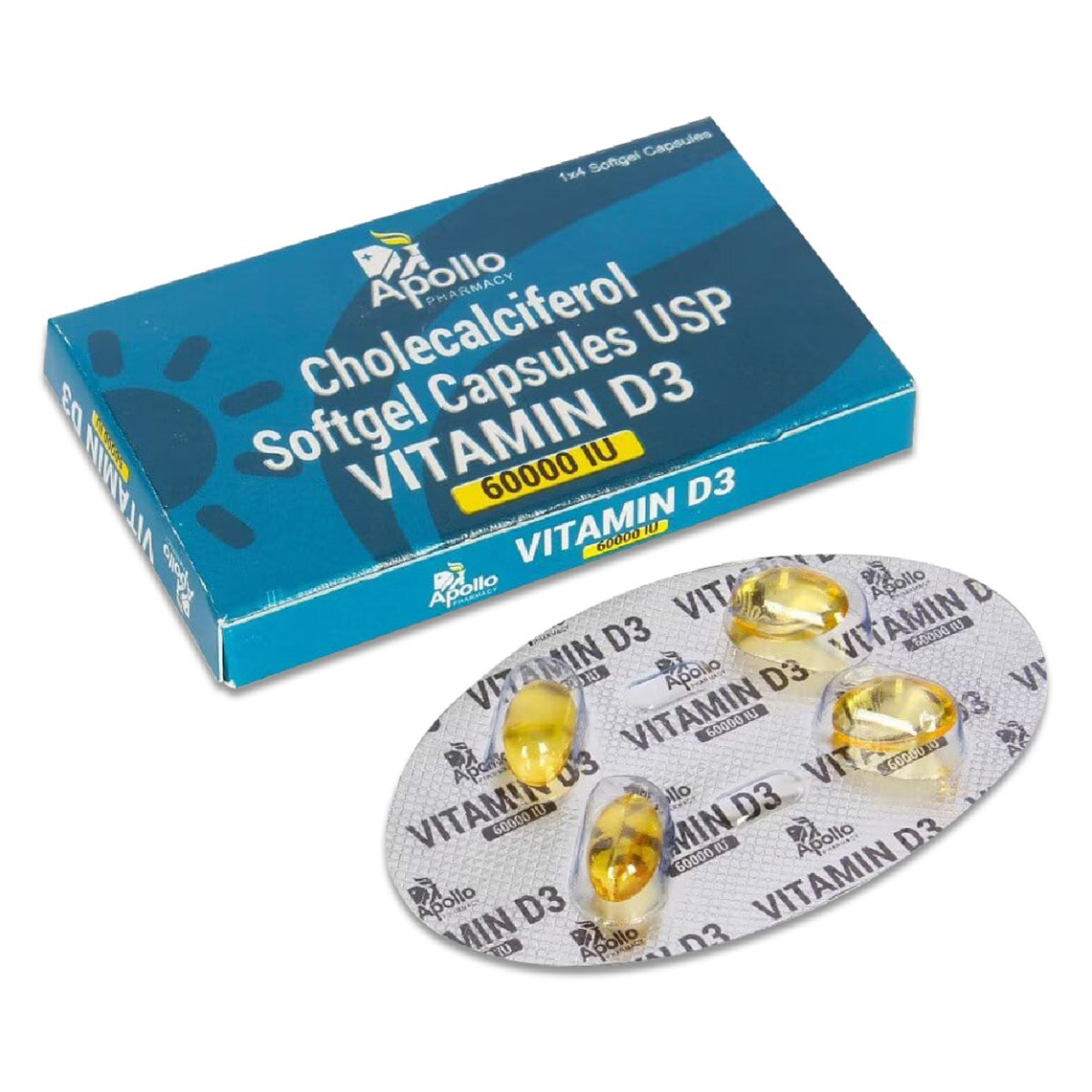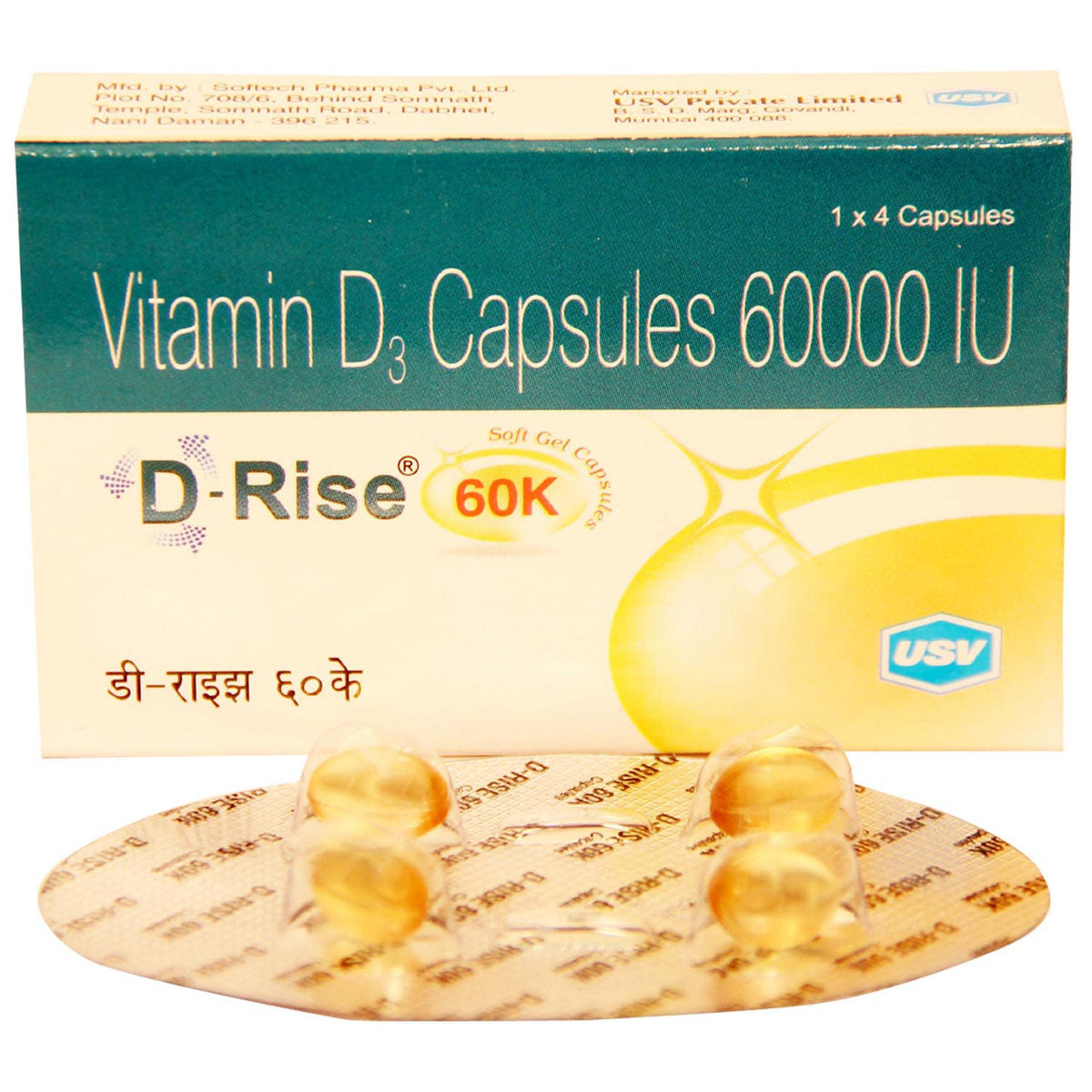Venlor-XR 75 Capsule
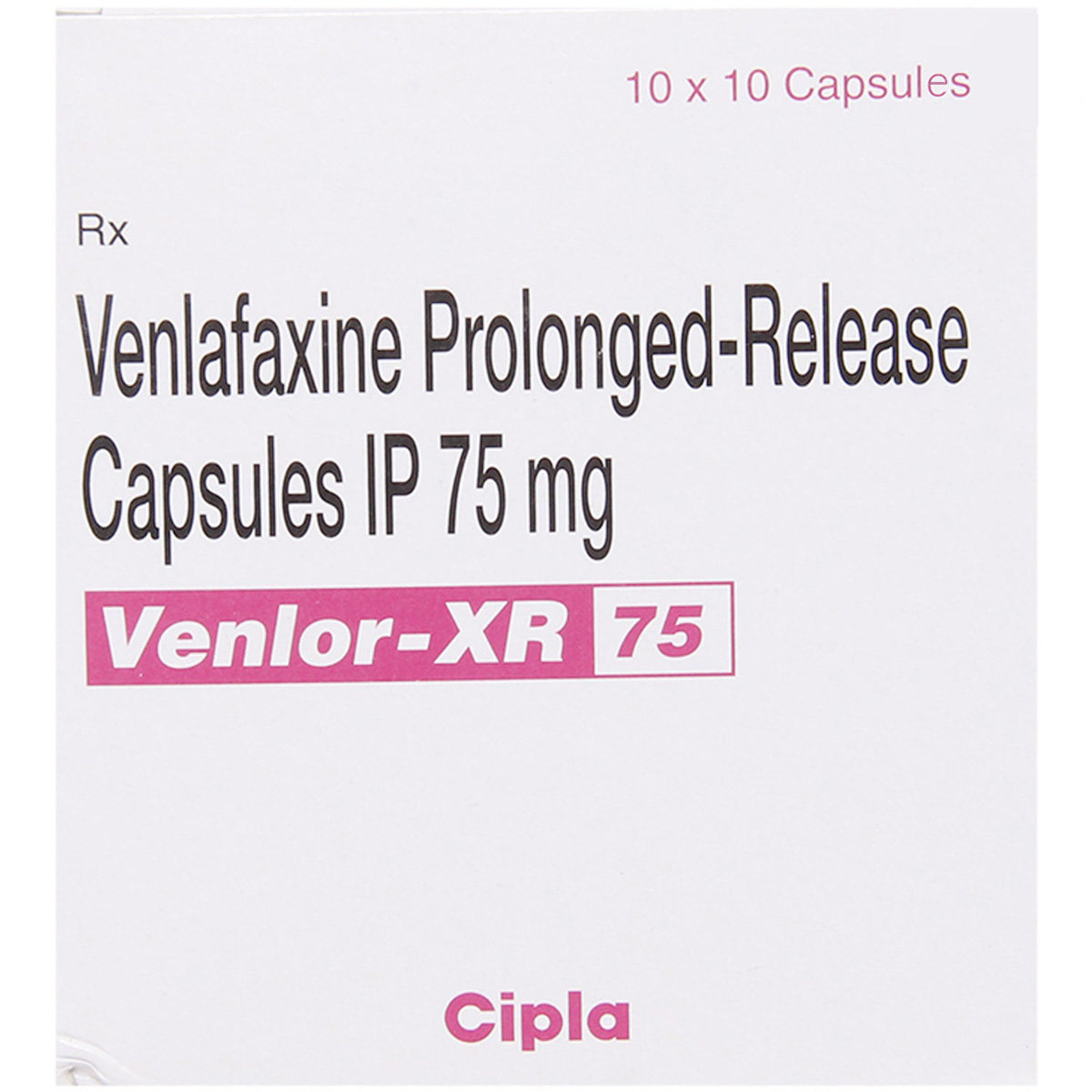
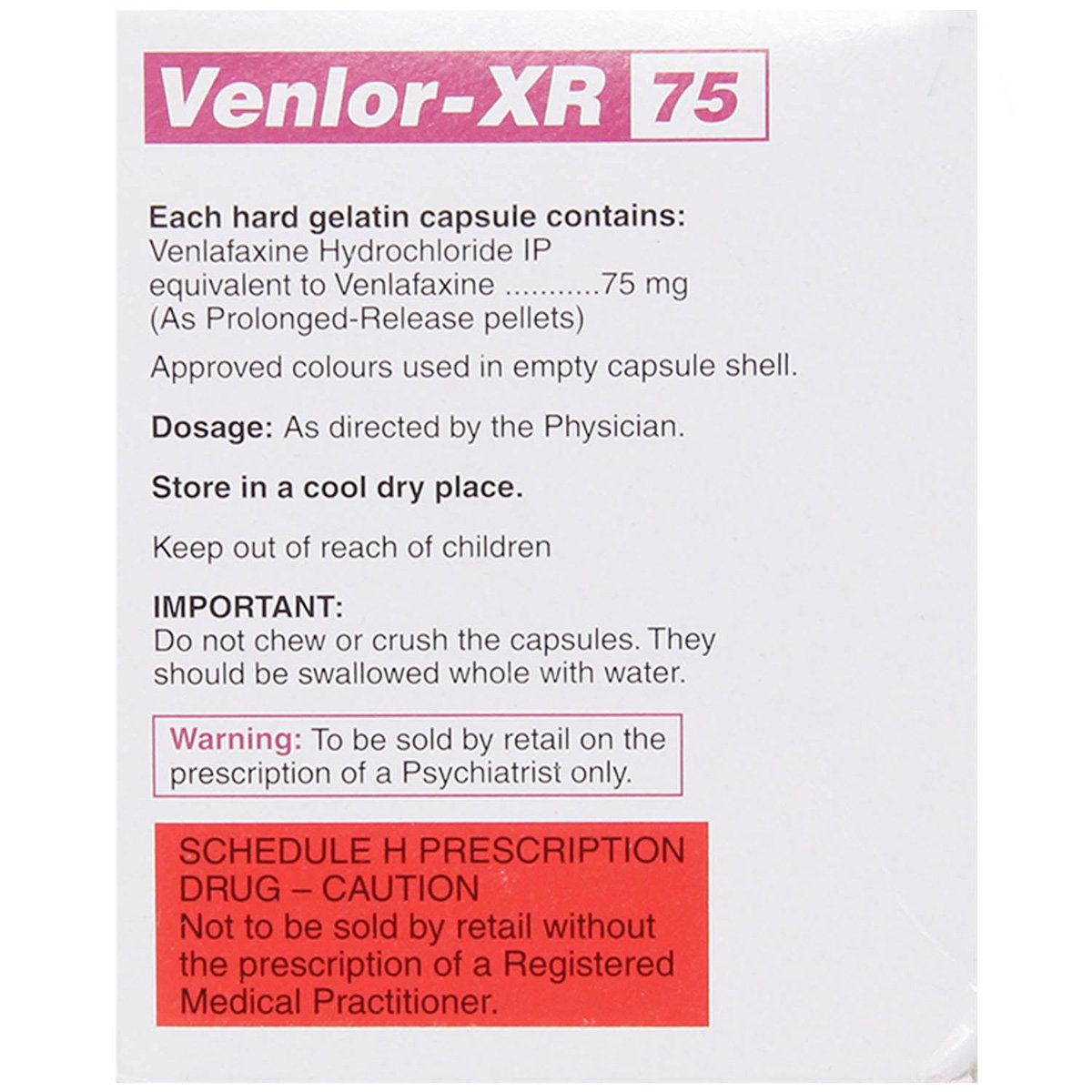
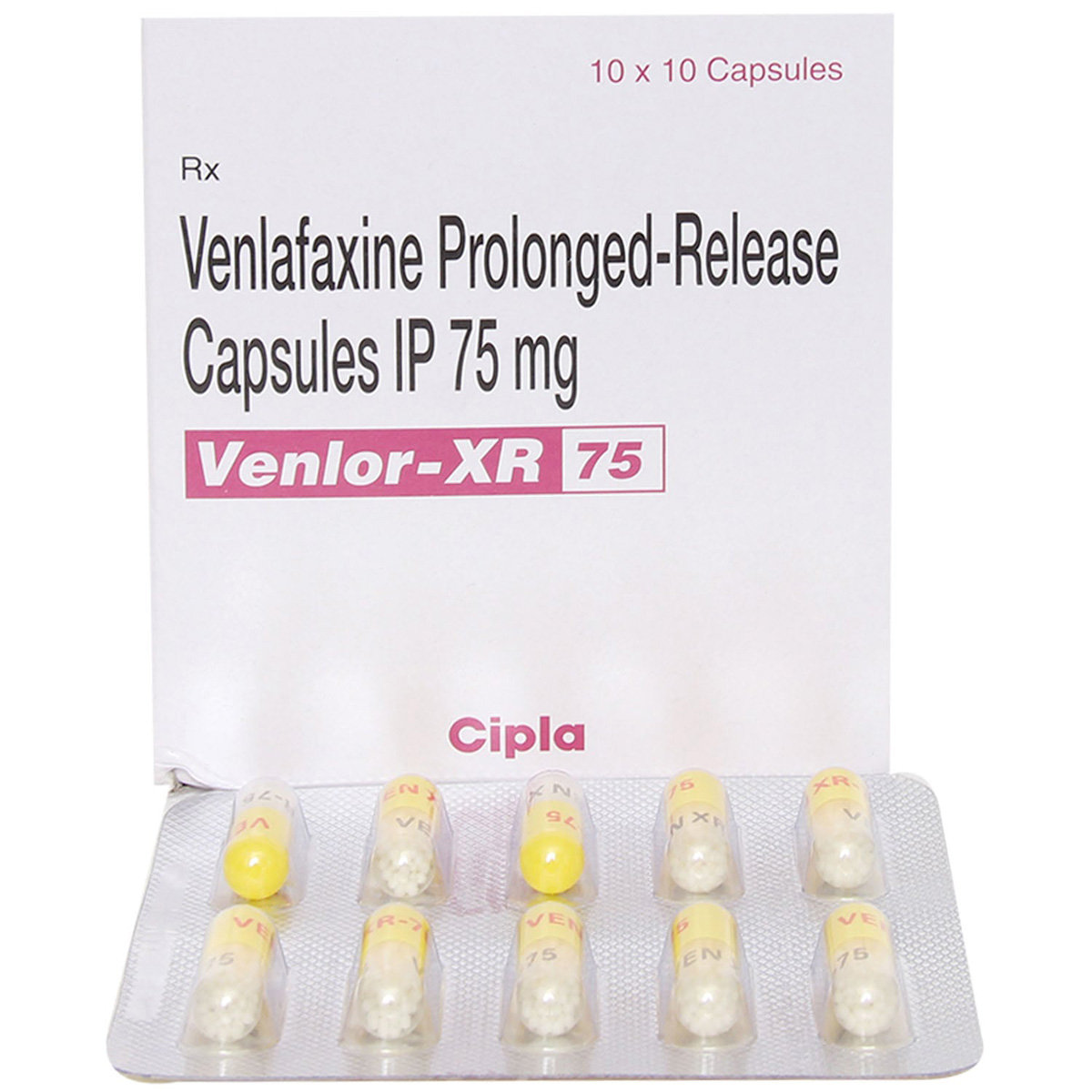
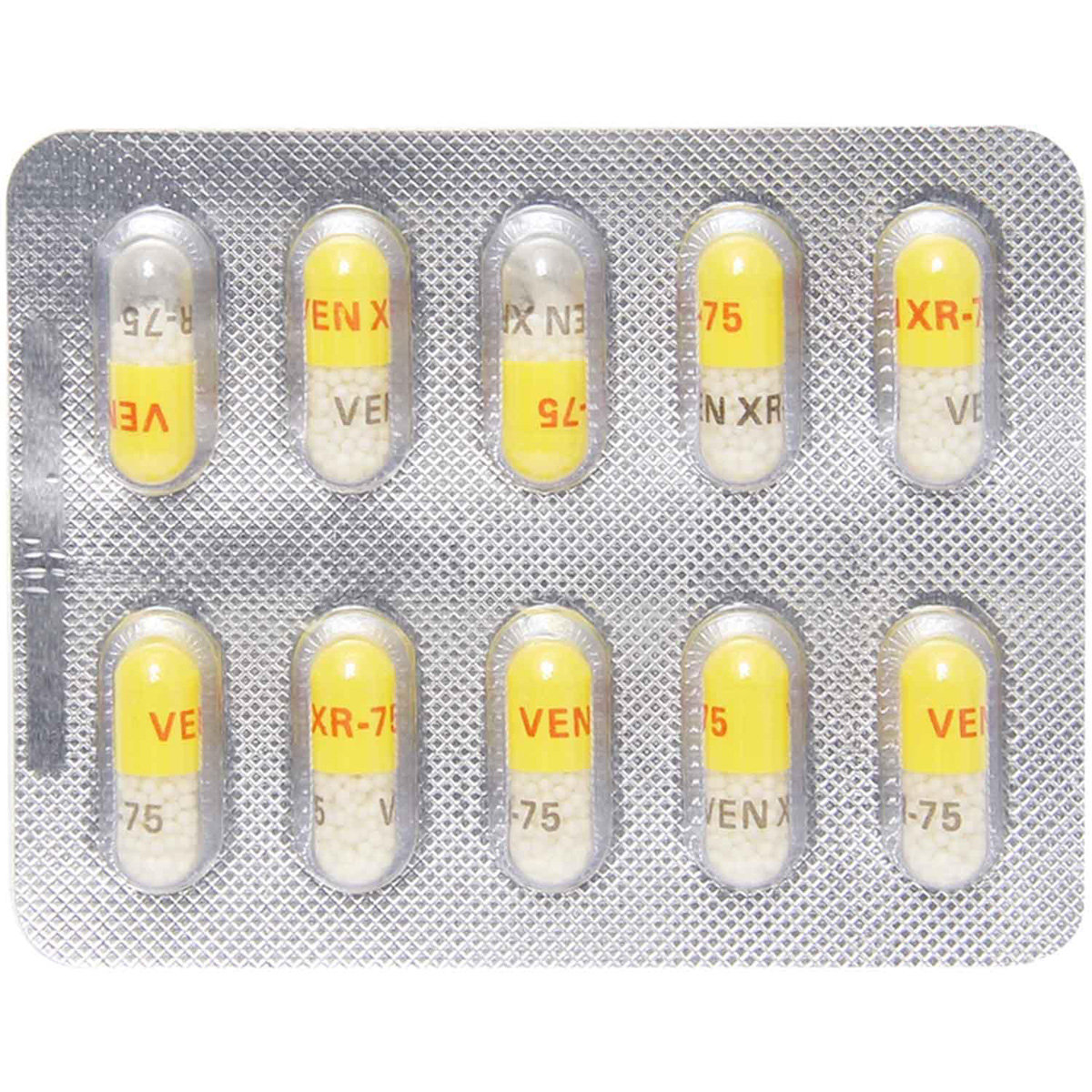
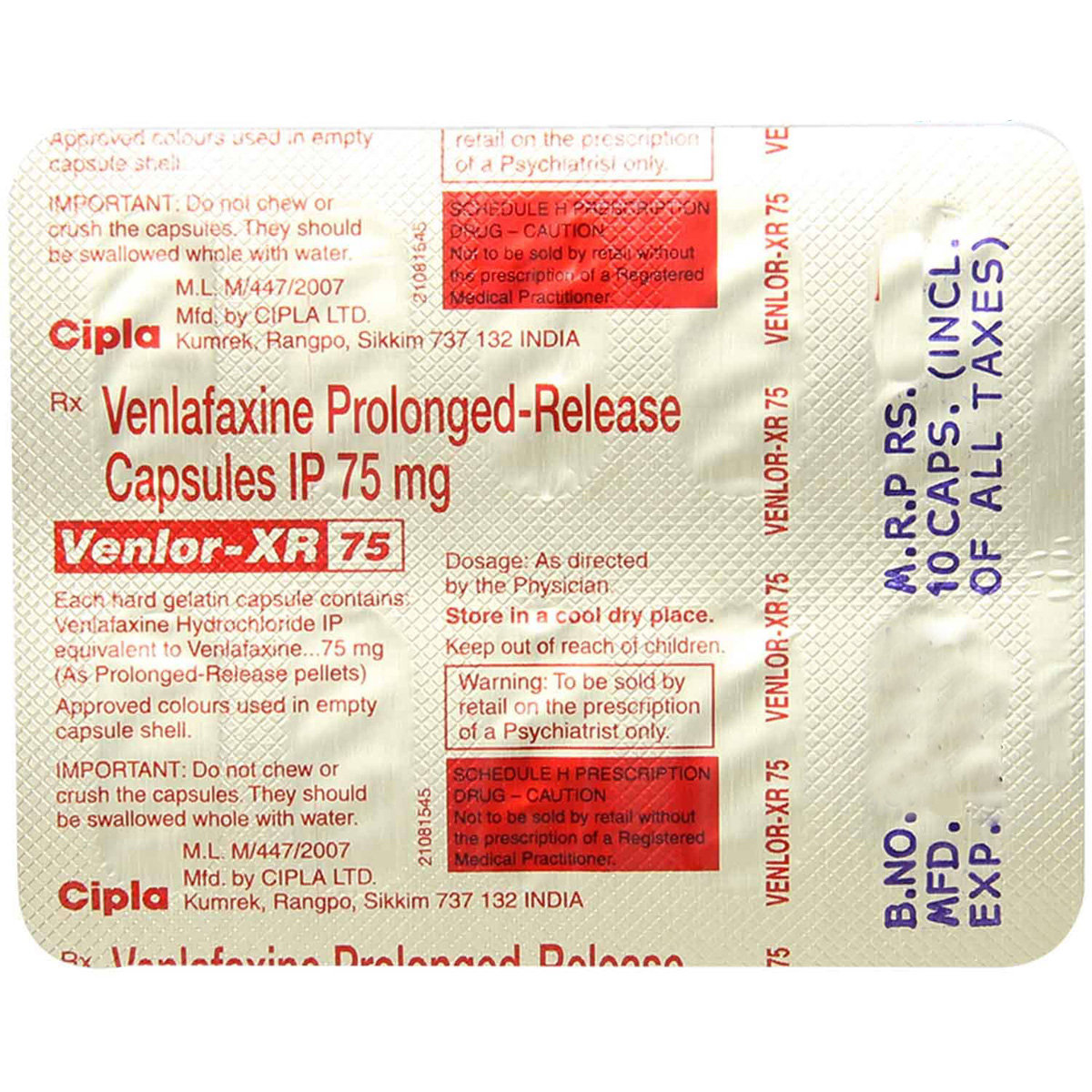
MRP ₹138.5
(Inclusive of all Taxes)
₹20.8 Cashback (15%)
know your delivery time
Provide Delivery Location
Composition :
Manufacturer/Marketer :
Consume Type :
Expires on or after :
Return Policy :

Secure Payment

Trusted by 8 Crore Indians

Genuine Products
Therapeutic Class
Country of origin
Manufacturer/Marketer address
Disclaimer
Alcohol
Safe if prescribed
Taking the drug along with alcohol may increase the side effects such as confusion, drowsiness, and trouble in concentration. A few people may find it difficult in doing mental tasks. A person needs to limit the use of alcohol while being treated with this medicine.
Pregnancy
Consult your doctor
Please visit your doctor. There are no competent and well-controlled pregnancy studies. Your doctor will only provide a prescription if the benefits outweigh the risks.
Breast Feeding
Consult your doctor
Consult your doctor; there has been no significant research on the use of Venlor-XR 75 Capsule in breastfeeding/nursing moms.
Driving
Safe if prescribed
Venlor-XR 75 Capsule can cause dizziness or may affect a person's ability to drive so one should avoid driving or doing any work that needs clear attention.
Liver
Consult your doctor
Inform your doctor before receiving the Venlor-XR 75 Capsule if you have a history of liver diseases/conditions. Your doctor may adjust your dose depending on your current liver conditions.
Kidney
Consult your doctor
Inform your doctor before receiving the Venlor-XR 75 Capsule if you have a history of kidney diseases/conditions. Your doctor may adjust yo ur dose depending upon your current kidney conditions.
Children
Safe if prescribed
The usage of Venlor-XR 75 Capsule is not allowed in children below 18 years old. However, this medicine can be used in children above 18 years after a doctor's recommendation
Product Substitutes
Reference
- https://www.ciplamed.com/content/venlor-xr-capsules#:~:text=Venlafaxine%20and%20its%20active%20metabolite,alpha1%2Dadrenergic%20receptors%20in%20vitro.
- https://www.drugs.com/venlafaxine.html#:~:text=Venlafaxine%20is%20an%20antidepressant%20belonging,disorder%2C%20anxiety%20and%20panic%20disorder.
- https://www.webmd.com/drugs/2/drug-4870-5047/venlafaxine-oral/venlafaxine-oral/details
- https://medlineplus.gov/druginfo/meds/a694020.html#:~:text=Children%20younger%20than%2018%20years,to%20treat%20a%20child's%20condition.
About Venlor-XR 75 Capsule
Venlor-XR 75 Capsule belongs to a group of medicines known as 'Antidepressants' It is primarily used to treat Major Depressive Disorder (MDD), Generalized Anxiety Disorder (GAD), Social Anxiety Disorder (SAD), and Panic Disorder. Major depressive disorder, also known as clinical depression, is a mental health disorder characterized by a persistent and intense feeling of sadness for an extended duration of time. Generalized anxiety disorder, or GAD, is a mental illness that makes a person worry more than normal. Social anxiety disorder is a chronic mental health condition that causes extreme fear, anxiety, embarrassment, and self-consciousness in social gatherings. Panic disorder is an anxiety disorder characterized by frequent episodes of panic or fear.
Venlor-XR 75 Capsule contains Venlafaxine belongs to a class of antidepressants known as serotonin and noradrenaline reuptake inhibitors, or SNRIs. These medications are thought to work by increasing the levels of mood-enhancing chemicals called serotonin and noradrenaline in the brain.
Venlor-XR 75 Capsule should be taken as prescribed by the doctor. You may experience feeling sick (nausea), sweating and hot flushes, headaches, a dry mouth, dizzy, sleepy, unable to sleep (insomnia) and constipation. Most of these side effects of Venlor-XR 75 Capsule do not require medical attention and gradually resolve over time. However, if the side effects are persistent, reach out to your doctor.
Before starting Venlor-XR 75 Capsule , please inform your doctor if you are pregnant and breastfeeding or if you have a high level of cholesterol, a low amount of sodium level in the blood, an increased risk of bleeding, suicidal thoughts, liver problems, kidney problems, weight loss, and heart diseases. Avoid driving or operating machinery as Venlor-XR 75 Capsule may cause dizziness, confusion, sleepiness and blurred vision. Venlor-XR 75 Capsule is not recommended for children below 18 years as safety and effectiveness have not been established. Avoid consumption of alcohol while taking Venlor-XR 75 Capsule as it may worsen your symptoms or side effects. Keep your doctor informed about your health condition and medicines to rule out any side effects.
Uses of Venlor-XR 75 Capsule
Medicinal Benefits Mweb
Key Benefits
Venlor-XR 75 Capsule contains Venlafaxine belongs to a class of antidepressants known as serotonin and noradrenaline reuptake inhibitors, or SNRIs. These medications are thought to work by increasing the levels of mood-enhancing chemicals called serotonin and noradrenaline in the brain.
Directions for Use
Side Effects of Venlor-XR 75 Capsule
- Feeling sick (nausea)
- Sweating and hot flushes
- Headaches
- A dry mouth
- Feeling dizzy
- Feeling sleepy
- Being unable to sleep (insomnia)
- Constipation
Drug Warnings
Do not take Venlor-XR 75 Capsule if you are allergic to any of its contents; if you are taking monoamine oxidase inhibitors (MAOI) or have taken them in the last 14 days, or if you are taking antipsychotic medicines. Consult your doctor immediately if you have suicidal thoughts, such as killing or harming yourself. Avoid driving or operating machinery as Venlor-XR 75 Capsule may cause dizziness, confusion, sleepiness and blurred vision. Venlor-XR 75 Capsule is not recommended for children below 18 years as safety and effectiveness have not been established. Avoid consumption of alcohol while taking Venlor-XR 75 Capsule as it may worsen your symptoms or side-effects.
Drug-Drug Interactions
Drug-Drug Interactions
Login/Sign Up
Taking Tranylcypromine with Venlor-XR 75 Capsule can increase the risk of serotonin syndrome(a A condition in which a chemical called serotonin increase in your body).
How to manage the interaction:
Taking Venlor-XR 75 Capsule with Tranylcypromine is not recommended, but can be taken together if prescribed by a doctor. However, consult a doctor if you experience confusion, hallucination(seeing and hearing things that do not exist), fits, blood pressure alteration, increased heart rate, fever, excessive sweating, shivering or shaking, blurred vision, pain in the muscles or stiffness, incoordination, stomach cramps, nausea, vomiting, and diarrhea. Do not discontinue any medications without consulting your doctor.
Taking Rasagiline with Venlor-XR 75 Capsule can increase the risk of serotonin syndrome (A condition in which a chemical called serotonin increase in your body).
How to manage the interaction:
Taking Venlor-XR 75 Capsule with Rasagiline is not recommended as it can possibly result in an interaction, it can be taken if your doctor has advised it. However, if you experience any symptoms like severe headache, blurred vision, confusion, seizures, chest pain, nausea or vomiting, sudden numbness or weakness (especially on one side of the body), speech difficulties, fever, sweating, lightheadedness, and fainting, contact your doctor immediately. Do not discontinue any medications without first consulting your doctor.
Taking Safinamide with Venlor-XR 75 Capsule can increase the risk of serotonin syndrome (A condition in which a chemical called serotonin increase in your body).
How to manage the interaction:
Taking Safinamide with Venlor-XR 75 Capsule is not recommended as it can possibly result in an interaction, , but can be taken together if prescribed by a doctor. However, consult a doctor if you experience confusion, hallucination(seeing and hearing things that do not exist), fits, changes in blood pressure, increased heart rate, fever, excessive sweating, shivering or shaking, blurred vision, pain in the muscles or stiffness, incoordination, stomach cramps, nausea, vomiting, and loose stools. Do not discontinue any medications without consulting your doctor.
Co-administration of Venlor-XR 75 Capsule with Ziprasidone can increase the risk of irregular heart rhythm.
How to manage the interaction:
Taking Ziprasidone with Venlor-XR 75 Capsule together can possibly result in an interaction, but it can be taken if a doctor has advised it. However, consult a doctor immediately if you experience any symptoms such as sudden dizziness, lightheadedness, fainting, shortness of breath, or heart palpitations. Do not discontinue any medications without consulting a doctor.
Coadministration of Metoclopramide with Venlor-XR 75 Capsule might raise serotonin hormone levels in the body, affecting the brain and nerve cells. Increased serotonin hormone can lead to side effects.
How to manage the interaction:
Taking Metoclopramide with Venlor-XR 75 Capsule together is generally avoided as it can possibly result in an interaction, it can be taken if your doctor has advised it. Do not discontinue any medications without consulting a doctor.
Taking Duloxetine with Venlor-XR 75 Capsule can increase the risk of serotonin syndrome (a condition in which a chemical called serotonin increase in body).
How to manage the interaction:
Although taking Duloxetine with Venlor-XR 75 Capsule can result in an interaction, they can be taken together if prescribed by a doctor. However, consult a doctor if you experience confusion, fever, excessive sweating, shivering, pain in the muscles or stiffness, stomach cramps, nausea, vomiting, and diarrhoea. Do not discontinue any medications without consulting a doctor.
When Venlor-XR 75 Capsule is combined with Dihydroergotamine, it can cause serotonin syndrome. Serotonin syndrome is a condition in which a chemical called serotonin builds up in your body, causing signs and symptoms ranging from mild (shivering and diarrhea) to severe (muscle rigidity, fever, and seizures).
How to manage the interaction:
Taking Venlor-XR 75 Capsule with Dihydroergotamine together can possibly result in an interaction, but it can be taken if your doctor has advised it. However, if you experience any of the following symptoms: confusion, hallucination, seizure, extreme changes in blood pressure, increased heart rate, fever, excessive sweating, shivering or shaking, blurred vision, muscle spasm or stiffness, tremor, incoordination, stomach cramp, nausea, vomiting, and diarrhoea, seek immediate medical attention. Do not discontinue any medications without consulting your doctor.
Coadministration of Ivabradine with Venlor-XR 75 Capsule can increase the risk or severity of irregular heart rhythm.
How to manage the interaction:
Taking Ivabradine with Venlor-XR 75 Capsule together can result in an interaction, it can be taken if a doctor has advised it. However, contact a doctor immediately if you experience sudden dizziness, lightheadedness, fainting, shortness of breath, chest pain or tightness, rapid heartbeat, or memory loss. Do not discontinue any medications without consulting a doctor.
When Venlor-XR 75 Capsule is combined with fenfluramine, it can cause serotonin syndrome (a condition in which a chemical called serotonin builds up in body).
How to manage the interaction:
Co-administration of Venlor-XR 75 Capsule with Fenfluramine can result in an interaction, but it can be taken if a doctor has advised it. However, if you experience any of the following symptoms: confusion, hallucination, seizure, extreme changes in blood pressure, increased heart rate, fever, excessive sweating, shivering or shaking, blurred vision, muscle spasm or stiffness, tremor, incoordination, stomach cramp, nausea, vomiting, and diarrhea, seek immediate medical attention. Do not discontinue any medications without consulting a doctor.
Co-administration of Sertraline and Venlor-XR 75 Capsule can increase the risk of serotonin syndrome (A condition in which a chemical called serotonin builds up in your body).
How to manage the interaction:
Co-administration of Sertraline and Venlor-XR 75 Capsule can lead to an interaction, it can be taken if advised by a doctor. However, if you experience any symptoms like confusion, hallucination, increased heart rate, fever, excessive sweating, shivering or shaking, blurred vision, muscle stiffness, tremors, stomach cramps, nausea, vomiting, and diarrhea, consult a doctor immediately. Do not stop using any medications without a doctor's advice.
Drug-Food Interactions
Drug-Food Interactions
Login/Sign Up
Drug-Diseases Interactions
Drug-Diseases Interactions
Login/Sign Up
Drug-Drug Interactions Checker List
- CLOPIDOGREL
- WARFARIN
- IBUPROFEN
- CODEINE
- HYDROCODONE
- LORAZEPAM
- ALPRAZOLAM
Habit Forming
Special Advise
- Do not make any changes in your dosing schedule without asking the doctor.
Diet & Lifestyle Advise
- Maintaining a healthy diet and exercising regularly helps improve overall health and boost self-esteem.
- Regularly attend therapy sessions.
- Perform meditation and yoga. This helps in relieving stress and provides relaxation.
- Follow a regular sleep pattern to improve the amount and quality of sleep you get.
- Include foods rich in omega fatty acids such as fish, nuts, fresh fruits, vegetables and olive oils.
- Neurotransmitters are made up of amino acids. Amino acid-rich foods such as meat, dairy products, and certain fruits and vegetables help properly maintain neurotransmitters.
- Complex carbohydrates help in stistimulateonin (a feel-good neurotransmitter). These include whole grains, legumes, spinach, broccoli, oranges and pears.
- Exercising helps in the production of the body’s natural antidepressants. It also relieves stress, improves mood, boosts self-esteem, and provides restful sleep.
- Avoid smoking and alcohol consumption.
- Learn about your condition, understand the risk factors and follow the doctor’s treatment plan.
All Substitutes & Brand Comparisons
RX
Out of StockEnvelaf 75mg Capsule XR
Alkem Laboratories Ltd
₹39
(₹3.51 per unit)
71% CHEAPERRX
Out of StockVenfine XR 75mg Capsule
Sanity Pharma
₹88.4
(₹7.96 per unit)
36% CHEAPERRX
Ventin-Xr 75mg Capsule 10's
D D Pharmaceuticals Pvt Ltd
₹90.5
(₹8.15 per unit)
34% CHEAPER
Buy best C.n.s Drugs products by
Intas Pharmaceuticals Ltd
Sun Pharmaceutical Industries Ltd
Torrent Pharmaceuticals Ltd
Alkem Laboratories Ltd
Abbott India Ltd
Cipla Ltd
Alteus Biogenics Pvt Ltd
Micro Labs Ltd
Lupin Ltd
Ipca Laboratories Ltd
D D Pharmaceuticals Pvt Ltd
Icon Life Sciences
Mankind Pharma Pvt Ltd
Tripada Healthcare Pvt Ltd
Arinna Lifesciences Ltd
Linux Laboratories Pvt Ltd
East West Pharma India Pvt Ltd
La Renon Healthcare Pvt Ltd
Talent India Pvt Ltd
Tas Med India Pvt Ltd
Zydus Healthcare Ltd
Cnx Health Care Pvt Ltd
Eris Life Sciences Ltd
Leeford Healthcare Ltd
Emcure Pharmaceuticals Ltd
Macleods Pharmaceuticals Ltd
Sigmund Promedica
Aristo Pharmaceuticals Pvt Ltd
Dr Reddy's Laboratories Ltd
Troikaa Pharmaceuticals Ltd
Consern Pharma Ltd
Zydus Cadila
Shine Pharmaceuticals Ltd
Wockhardt Ltd
Ardent Life Sciences Pvt Ltd
Crescent Formulations Pvt Ltd
Theo Pharma Pvt Ltd
Reliance Formulation Pvt Ltd
Ikon Pharmaceuticals Pvt Ltd
Propel Healthcare
Neon Laboratories Ltd
Jagsam Pharma
Msn Laboratories Pvt Ltd
Morepen Laboratories Ltd
Pulse Pharmaceuticals
Sanofi India Ltd
Med Manor Organics Pvt Ltd
Hetero Healthcare Pvt Ltd
Novartis India Ltd
Crescent Therapeutics Ltd
Elder Pharmaceuticals Ltd
Solvate Laboratories Pvt Ltd
Akumentis Healthcare Ltd
Mova Pharmaceutical Pvt Ltd
Psyco Remedies Ltd
Tripada Lifecare Pvt Ltd
Ajanta Pharma Ltd
Cyrus Remedies Pvt Ltd
Medishri Healthcare Pvt Ltd
Cadila Healthcare Ltd
Glenmark Pharmaceuticals Ltd
Matteo Health Care Pvt Ltd
Hbc Life Sciences Pvt Ltd
Lyf Healthcare
Matias Healthcare Pvt Ltd
Mesmer Pharmaceuticals
Alembic Pharmaceuticals Ltd
Capital Pharma
Crescent Pharmaceuticals
Medopharm Pvt Ltd
Alniche Life Sciences Pvt Ltd
Kivi Labs Ltd
Talin Remedies Pvt Ltd
USV Pvt Ltd
Quince Lifesciences Pvt Ltd
Solis Pharmaceuticals
Infivis Life Care
Zuventus Healthcare Ltd
Cadila Pharmaceuticals Ltd
Pfizer Ltd
Wallace Pharmaceuticals Pvt Ltd
A N Pharmacia Laboratories Pvt Ltd
Blue Cross Laboratories Pvt Ltd
Jenburkt Pharmaceuticals Ltd
Lia Life Sciences Pvt Ltd
Mano Pharma
Medley Pharmaceuticals Ltd
Primus Remedies Pvt Ltd
FDC Ltd
Maneesh Pharmaceuticals Ltd
Apex Laboratories Pvt Ltd
Gagnant Healthcare Pvt Ltd
Ozone Pharmaceuticals Ltd
RPG Life Sciences Ltd
Strides Shasun Ltd
Unichem International
GlaxoSmithKline Pharmaceuticals Ltd
Kuresys Labs Pvt Ltd
LA Pharma
Trion Pharma India Llp
Frequently Bought Together



